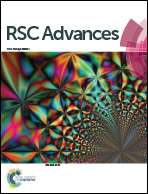Charge transfer plasmon resonances across silver–molecule–silver junctions: estimating the terahertz conductance of molecules at near-infrared frequencies
Abstract
Quantum plasmon resonances have been recently observed across molecular tunnel junctions made of two plasmonic resonators bridged by a self-assembled monolayer (SAM). The energy of this quantum plasmon mode, i.e., the tunneling charge transfer plasmon (tCTP), depends on the properties of the molecules bridging the gaps. The present work extends these studies theoretically using a generalized space-charge corrected electromagnetic model to a wider range of SAM structures (with various molecular lengths and conductances) sandwiched between silver nanocubes, which could support different types of CTP resonances in addition to tCTP. The space-charge corrected electromagnetic model treats the charge injection and charge transport separately, and assumes a Drude expression (with damping frequency on the order of driving frequency) to model the space-charge limited transport problem. Our theoretical modelling of these organic–inorganic hybrid structures establishes a one-to-one relationship between the conductivity of the SAM and the resonant energy of the CTP modes. Considering that the SAM consists of a finite number of molecules bridging the two nanocubes in a parallel arrangement, we introduce a method to estimate the molecular conductance at the CTP resonant frequency. Experimental results from two types of SAMs were examined as a proof-of-concept: the THz conductance is estimated to be 0.2G0 per EDT (1,2-ethanedithiolate) molecule at 140 THz and 0.4G0 for a BDT (1,4-benzenedithiolate) molecule at 245 THz. This approach paves the way of using plasmonic oscillations for measuring the THz conductance of single molecules at near-infrared frequencies.


 Please wait while we load your content...
Please wait while we load your content...